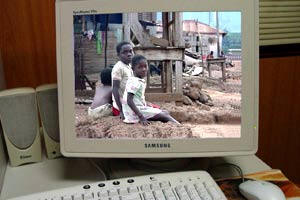
Internet for All, a Chimera?
By: Daynet Rodríguez Sotomayor
05/16/2006
 Figures
hardly vary. 90% of the world population does not have access to the Internet.
In
Figures
hardly vary. 90% of the world population does not have access to the Internet.
In

Internet for All, a
Chimera?
By:
Daynet Rodríguez Sotomayor
05/16/2006
 Figures
hardly vary. 90% of the world population does not have access to the Internet.
In
Figures
hardly vary. 90% of the world population does not have access to the Internet.
In
The international community celebrates
the World Internet and Telecommunication Day this May 17, geared at diffusing
the opportunities that the Information Society provides. But it continues being
a chimera to think that this is a universal celebration: to the immense majority
of the
It is the reality of the digital gap, or more clearly, the social gap. Those deprived of the basic services of survival: water, food, electricity, education, health, can hardly join the virtual race and the knowledge society.
Some time ago, we reproduced an interview by Cuban Informatics and Communications Minister Ignacio González Planas, in which he commented an experience lived in one of the Information Summits: “At the Round Table in which I participated representing Cuba, the delegate of an African country said in the middle of the debate on the access of our countries to the ICTs: “What are we talking about here, since in my country we only have 0.16 telephones per 100 inhabitants?”.
Although many placed their hopes and even some affirm that the new technologies and the Internet can contribute to sustainable development, the network has come to extend the traditional barriers between rich and poor, a lethal thrust in this new millennium, when it is taking shape as the most prized property.
Political obstacles rather than financial ones
In 2003, the United Nations sponsored
the celebration of the 1st World Summit on the Information Society in
They also agreed to create a fund to help the developing counties profit from the new technology.
Two years later, in November 2005, the sad reality faced the attendees at the 2nd Summit held in Tunisia: the most immediate goals could not be fulfilled and again the main theme on debate was the access of underdeveloped countries to the network of networks and the ICTs, because –according to the International Telecommunication Union (ITU)– the inhabitants from these nations make up 85% of the world population that lack these services.
UN Secretary-General Kofi Annan recognized himself how little society has advanced in the issue and asked the international community to mobilize itself to put the new communication technologies at the service of all.
"The obstacles have a political nature rather than a financial one. It’s possible to reduce the cost of the connections, the computers and the portable telephones", he complained.
The attempts crash again and again with the opposition of the industrialized nations to pay a compulsory contribution to the developing countries.
More than will to share resources and
technologies the event showed the
The representatives from the private sector, for their part, have rejected the idea of tax on the revenues from telecommunications services to dedicate it to the least rentable zones.
In the theme Internet access for all,
our country has expressed an opposition of principles. "Cuba upholds that the
Knowledge Society should be equitable, encourage the mass use of the Information
and Communication Technologies (ICT) with well-articulated human resources and
structure a national system of organized teaching", said recently at the
International Congress ‘Info
Right at the Tunisia Summit, the Cuban delegates denounced that the Information Society is chimera when starvation and poverty prevail in the world; bet on multilateralism in Internet governance.
In the domestic level and despite the limitations in the technological infrastructure, the island proves that it’s possible to set priority on Internet access, from the social prospect. "We’ve privileged its use in the social field, public health, education, science and technique, local and national press and television, culture, banking the most important braches of the economy and, more recently, the services to the population", Minister González Planas affirms.
"What we have advanced has been possible applying a policy according to our economic situation and our development plans".
In a world where the Internet and
telecommunications are only a remote hope,
Cubasí Translation Staff
http://www.cubasi.com/DesktopDefault.aspx?SPK=160&CLK=120274&LK=2&CK=62601&SPKA=35